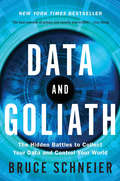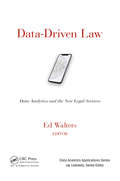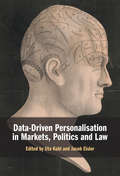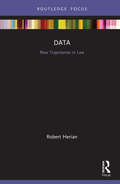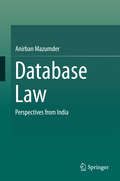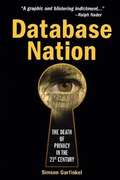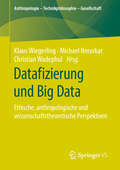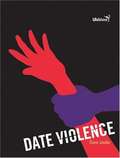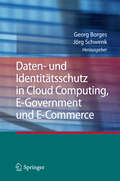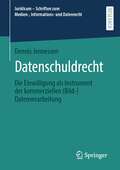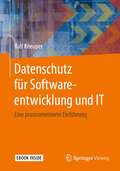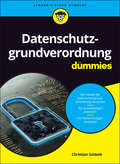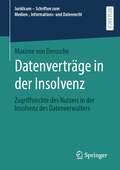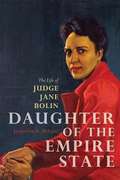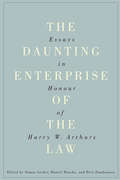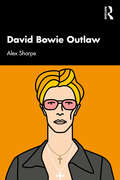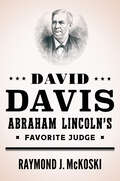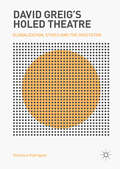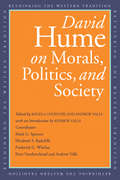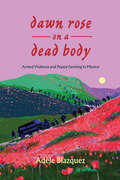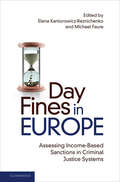- Table View
- List View
Data and Goliath: The Hidden Battles to Collect Your Data and Control Your World
by Bruce SchneierYou are under surveillance right now.<P><P> Your cell phone provider tracks your location and knows who’s with you. Your online and in-store purchasing patterns are recorded, and reveal if you're unemployed, sick, or pregnant. Your e-mails and texts expose your intimate and casual friends. Google knows what you’re thinking because it saves your private searches. Facebook can determine your sexual orientation without you ever mentioning it.<P> The powers that surveil us do more than simply store this information. Corporations use surveillance to manipulate not only the news articles and advertisements we each see, but also the prices we’re offered. Governments use surveillance to discriminate, censor, chill free speech, and put people in danger worldwide. And both sides share this information with each other or, even worse, lose it to cybercriminals in huge data breaches.<P> Much of this is voluntary: we cooperate with corporate surveillance because it promises us convenience, and we submit to government surveillance because it promises us protection. The result is a mass surveillance society of our own making. But have we given up more than we’ve gained? In Data and Goliath, security expert Bruce Schneier offers another path, one that values both security and privacy. He shows us exactly what we can do to reform our government surveillance programs and shake up surveillance-based business models, while also providing tips for you to protect your privacy every day. You'll never look at your phone, your computer, your credit cards, or even your car in the same way again.
Data-Driven Law: Data Analytics and the New Legal Services (Data Analytics Applications)
by Edward J. WaltersFor increasingly data-savvy clients, lawyers can no longer give "it depends" answers rooted in anecdata. Clients insist that their lawyers justify their reasoning, and with more than a limited set of war stories. The considered judgment of an experienced lawyer is unquestionably valuable. However, on balance, clients would rather have the considered judgment of an experienced lawyer informed by the most relevant information required to answer their questions. Data-Driven Law: Data Analytics and the New Legal Services helps legal professionals meet the challenges posed by a data-driven approach to delivering legal services. Its chapters are written by leading experts who cover such topics as: Mining legal data Computational law Uncovering bias through the use of Big Data Quantifying the quality of legal services Data mining and decision-making Contract analytics and contract standards In addition to providing clients with data-based insight, legal firms can track a matter with data from beginning to end, from the marketing spend through to the type of matter, hours spent, billed, and collected, including metrics on profitability and success. Firms can organize and collect documents after a matter and even automate them for reuse. Data on marketing related to a matter can be an amazing source of insight about which practice areas are most profitable. Data-driven decision-making requires firms to think differently about their workflow. Most firms warehouse their files, never to be seen again after the matter closes. Running a data-driven firm requires lawyers and their teams to treat information about the work as part of the service, and to collect, standardize, and analyze matter data from cradle to grave. More than anything, using data in a law practice requires a different mindset about the value of this information. This book helps legal professionals to develop this data-driven mindset.
Data-Driven Personalisation in Markets, Politics and Law
by Uta Kohl Jacob EislerThe most fascinating and profitable subject of predictive algorithms is the human actor. Analysing big data through learning algorithms to predict and pre-empt individual decisions gives a powerful tool to corporations, political parties and the state. Algorithmic analysis of digital footprints, as an omnipresent form of surveillance, has already been used in diverse contexts: behavioural advertising, personalised pricing, political micro-targeting, precision medicine, and predictive policing and prison sentencing. This volume brings together experts to offer philosophical, sociological, and legal perspectives on these personalised data practices. It explores common themes such as choice, personal autonomy, equality, privacy, and corporate and governmental efficiency against the normative frameworks of the market, democracy and the rule of law. By offering these insights, this collection on data-driven personalisation seeks to stimulate an interdisciplinary debate on one of the most pervasive, transformative, and insidious socio-technical developments of our time.
Data: New Trajectories in Law (New Trajectories in Law)
by Robert HerianThis book explores the phenomenon of data – big and small – in the contemporary digital, informatic and legal-bureaucratic context. Challenging the way in which legal interest in data has focused on rights and privacy concerns, this book examines the contestable, multivocal and multifaceted figure of the contemporary data subject. The book analyses "data" and "personal data" as contemporary phenomena, addressing the data realms, such as stores, institutions, systems and networks, out of which they emerge. It interrogates the role of law, regulation and governance in structuring both formal and informal definitions of the data subject, and disciplining data subjects through compliance with normative standards of conduct. Focusing on the ‘personal’ in and of data, the book pursues a re-evaluation of the nature, role and place of the data subject qua legal subject in on and offline societies: one that does not begin and end with the inviolability of individual rights but returns to more fundamental legal principles suited to considerations of personhood, such as stewardship, trust, property and contract. The book’s concern with the production, use, abuse and alienation of personal data within the context of contemporary communicative capitalism will appeal to scholars and students of law, science and technology studies, and sociology; as well as those with broader political interests in this area.
Database Law: Perspectives from India
by Anirban MazumderThis book focuses on database law (a branch of intellectual property law) and further explores the legal protection currently available for data and data-related products in India. It offers a comparative study of the position of copyright law in protecting databases in the US and EU, while also presenting responses from the Indian database industry and its aspirations regarding the role of copyright law in database protection. India is undoubtedly leading the way as a knowledge economy. Its strengths are its information technology capability and its knowledge society, as well as its booming database industry aspects that also necessitate the study of the role of law, as well as the protection of data and databases, in India. This book examines the growing importance of copyright law for protecting databases as well as for ensuring access in information societies. The book concludes with a discussion of key principles to be kept in mind in the context of drafting legal regimes for databases in India that will both benefit the database industry and ensure accessibility. "
Database Nation: the Death of Privacy in the 21st Century
by Simson GarfinkelDiscusses the many ways in which individual privacy has been and is being eroded, as personal information is gathered and stored without your knowledge.
Datafizierung und Big Data: Ethische, anthropologische und wissenschaftstheoretische Perspektiven (Anthropologie – Technikphilosophie – Gesellschaft)
by Klaus Wiegerling Michael Nerurkar Christian WadephulDer Band versammelt Beiträge, die sich mit ethischen, anthropologischen und wissenschaftstheoretischen Aspekten informationstechnologischer Anwendungen, insbesondere Big Data, befassen. In unterschiedlichen disziplinären Perspektiven werden die Auswirkungen dieser Technologien auf Individuum, Gesellschaft und Wissenschaft in den Blick genommen.
Date Violence
by Elaine LandauDating is one of the most exciting and nerve-wracking parts of teenage life. For many teens, dating is about having fun and forging new relationships; for others it evolves into a destructive and frightening experience as a result of date violence. Through real-life stories and experiences, author Elaine Landau explores all aspects of abusive relationships, including the warning signs of dating abuse and common characteristics of abusers. To help teens nourish a healthy relationship, guidelines for dating are also included.
Daten- und Identitätsschutz in Cloud Computing, E-Government und E-Commerce
by Jörg Schwenk Georg BorgesFür neue und künftige Geschäftsfelder von E-Commerce und E-Government stellen der Datenschutz und der Identitätsschutz wichtige Herausforderungen dar. Renommierte Autoren aus Wissenschaft und Praxis widmen sich in dem Band aktuellen Problemen des Daten- und Identitätsschutzes aus rechtlicher und technischer Perspektive. Sie analysieren aktuelle Problemfälle aus der Praxis und bieten Handlungsempfehlungen an. Das Werk richtet sich an Juristen und technisch Verantwortliche in Behörden und Unternehmen sowie an Rechtsanwälte und Wissenschaftler.
Datenschuldrecht: Die Einwilligung als Instrument der kommerziellen (Bild-)Datenverarbeitung (Juridicum – Schriften zum Medien-, Informations- und Datenrecht)
by Dennis JennessenAls Instrument der kommerziellen Bilddatenverarbeitung ist die Einwilligung längst anerkannt. Seit Jahrzehnten ist es ständige Rechtsprechung, dass ein Betroffener einen sog. Model-Release-Vertrag mit einem Presseunternehmen abschließen kann, durch den das Presseunternehmen berechtigt wird, das Bildnis des Betroffenen abzudrucken und der Betroffene in der Regel ein Entgelt hierfür erhält. Als Instrument der kommerziellen Datenverarbeitung allgemein ist die Einwilligung hingegen höchst umstritten. Paradigmatisch dafür ist, dass in der Richtlinie über digitale Inhalte zunächst niedergelegt werden sollte, dass Verträge auch gegen Hingabe von personenbezogenen Daten anstelle eines Preises geschlossen werden können. Diese Formulierung ist in der letztendlichen Fassung der Digitale-Inhalte-Richtlinie aber nicht mehr vorhanden. Die Digitale-Inhalte-Richtlinie erlaubt in ihrer endgültigen Fassung einzig eine Anwendbarkeit auf Verträge, die Daten als Gegenleistung ansehen, überlässt die Frage, ob und unter welchen Voraussetzungen derartige Verträge geschlossen werden können aber den nationalen Rechtsordnungen. Um diesen Gestaltungsspielraum auszufüllen, entwickelt die Arbeit ausgehend von der ständigen Rechtspraxis bei der kunsturheberrechtlichen Einwilligung und unter Berücksichtigung der Vorgaben des europäischen Datenschutzrechts praxisorientierte Ergebnisse für die datenschutzrechtliche Einwilligung, die als Gegenleistung in einem Vertrag fungiert.
Datenschutz bei Virtual und Augmented Reality: Einwilligung und Interessenabwägung zur Legitimation von Bewegungstracking und Umgebungserfassung (Juridicum – Schriften zum Medien-, Informations- und Datenrecht)
by Lava GaffVirtual und Augmented Realityist eine Technologie, die es dem Nutzer ermöglicht, eine vollständig computergenerierte Welt oder die echte Umgebung um virtuelle Inhalte modifiziert wahrzunehmen. In dieser Arbeit werden zwei zentrale Funktionen dieser Technologie aus datenschutzrechtlicher Perspektive untersucht: das Bewegungstracking bei Virtual Reality und die kamerabasierte Umgebungserfassung bei Augmented Reality. Im ersten Teil wird die Kategorie der Daten untersucht, die durch das Bewegungstracking verarbeitet werden. Vorgeschlagen wird das Konzept einer Zwei-Stufen-Einwilligung, das dabei durch den Grundsatz des Privacy-by-Designs gestützt wird. Die Umgebungserfassung ist eine allgegenwärtige Verarbeitung im öffentlichen Raum, von der eine Vielzahl von Grundrechtsträgern betroffen sind und mit der zugleich eine Vielzahl von Grundrechtsträgern ihre Interessen wahrnehmen. Unterbreitet werden mögliche Lösungsansätze de lege ferenda, um eine allgegenwärtige Datenverarbeitung zu rechtfertigen. Am Beispiel der datenschutzfreundlichen Technikgestaltung bei Augmented Reality wird aufgezeigt, dass diese unerlässlich ist, um eine allgegenwärtige Datenverarbeitung grundrechtskonform einzusetzen.
Datenschutz für Entscheider in Marketing und Vertrieb: Die DSGVO – Vom Spielverderber zum Wettbewerbsvorteil
by Andreas Krämer Reinhold MauerDieses Buch sensibilisiert für die konkreten Anforderungen, die mit der DSGVO verbunden sind. Es stellt Hinweise bereit, die helfen sollen, grobe Fehler zu verhindern, aber auch aufzeigen, wie durch ein aktives Management Wettbewerbsvorteile durch Datenschutz erreicht werden können. Die Autoren zielen darauf ab, erstens in knapper und eingängiger Form Transparenz zu den rechtlichen Rahmenbedingungen durch die DSGVO allgemein und speziell in Bezug auf Aktivitäten in Marketing und Vertrieb zu schaffen. Im Hauptteil wird zweitens anhand von ausgewählten Marketing- und Vertriebsaktivitäten aufgezeigt, an welchen Stellen Datenschutzbestimmungen (als limitierender Faktor) wirken und welche Maßnahmen erforderlich sind, um das volle Marketingpotenzial im Kundenkontakt ausschöpfen zu können. Betrachtet werden Marketingaktivitäten, die für Unternehmen zum einen wichtig sind (z. B. unmittelbares Umsatzpotenzial) oder eine direkte Schnittstelle zum Kunden bilden und zum anderen Bereiche, in denen derzeit starke Unsicherheiten bei den Entscheidern in Hinblick auf datenschutzrechtliche Belange bestehen. Diese betreffen die Erfassung, Speicherung und Nutzung von personenbezogenen Daten. Abschließend wird drittens aufgezeigt, wie sich das Thema Datenschutz aus der Rolle eines limitierenden Faktors zu einem Erfolgsfaktor für das Marketing umgestalten lässt. Dazu bieten Checklisten eine komprimierte Orientierungshilfe im operativen Bereich.
Datenschutz für Softwareentwicklung und IT: Eine praxisorientierte Einführung
by Ralf KneuperDieses Buch beschreibt das Thema Datenschutz aus der Sicht von Softwareentwicklung und IT. Die Verantwortlichen in diesen Bereichen gestalten die praktische Umsetzung des Datenschutzes zu erheblichen Teilen mit, benötigen dafür aber entsprechende Kenntnisse über die rechtlichen Rahmenbedingungen und Möglichkeiten zu deren Umsetzung. Der Fokus dieses Buchs liegt daher auf den Aspekten des Datenschutzes, die durch Softwareentwicklung stark beeinflusst werden, wie z.B. Privacy by Design, Privacy by Default, Datenminimierung, Umsetzung von Auskunftsrechten sowie Datenlöschung.
Datenschutzgrundverordnung für Dummies (Für Dummies)
by Christian SzidzekDer Datenschutz hat mit dem Erlass der Datenschutzgrundverordnung noch an Bedeutung gewonnen. Bei Verstößen drohen inzwischen hohe Bußgelder. Dieses Buch bietet einen einfachen, verständlichen und - gemessen an der Materie - unterhaltsamen Einstieg in das Thema. Es richtet sich an Nicht-Juristen ohne Vorwissen. Zahlreiche Praxiserfahrungen des Autors veranschaulichen die Fallstricke und Probleme des Datenschutzes und machen das Thema besser verständlich und das Buch gut lesbar. Ein eigener Teil mit Hinweisen und Tipps für ein praktikables Datenschutzmanagement rundet das Angebot ab. Dieses Buch schützt nicht nur Ihre Daten, sondern auch Ihr Unternehmen.
Datenverträge in der Insolvenz: Zugriffsrechte des Nutzers in der Insolvenz des Datenverwalters (Juridicum – Schriften zum Medien-, Informations- und Datenrecht)
by Maxime von DreuscheDieser Band widmet sich einem aktuellen Thema an der Schnittstelle des Daten- und Insolvenzrechts. Immer mehr Nutzer speichern ihre Daten in der Cloud, laden Filme und Musik im Internet herunter oder verbringen ihre Zeit beim Online-Gaming. Doch was passiert mit den gespeicherten Daten, wenn über das Vermögen eines datenverwaltenden Unternehmens das Insolvenzverfahren eröffnet wird? Kann der Nutzer weiter auf die Daten zugreifen oder zumindest deren Herausgabe verlangen? Diese Fragen sind in einer von großen Datenmengen geprägten Welt – heute wie auch in Zukunft – von zentraler Bedeutung. Betroffene Unternehmen wie Privatpersonen haben nämlich ein starkes Interesse daran, alsbald wieder auf „ihre“ Daten zugreifen zu können.Die Publikation geht diesen Problemstellungen am Beispiel der besonders virulenten Cloud-Speicher-Verträge als auch anhand anderer Datenverträge mit datenverwaltendem Charakter nach, namentlich E-Mail- und Messenger-Diensten, Video- und Audio-on-Demand-Angeboten und dem Online-Gaming Bereich. Schwerpunktmäßig wird die Frage des Fortbestands der ausgewählten Datenverträge in der Insolvenz nach §§ 108 Abs. 1 S. 1, 103 InsO sowie die Möglichkeit der Aussonderung von Daten nach § 47 InsO untersucht. In diesem Kontext wird auch die Zuordnung von Daten thematisiert.
Daughter of the Empire State: The Life of Judge Jane Bolin
by Jacqueline A. McleodThis long overdue biography elevates Jane Matilda Bolin to her rightful place in American history as an activist, integrationist, jurist, and outspoken public figure in the political and professional milieu of New York City before the onset of the modern Civil Rights movement. When Bolin was appointed to New York City's domestic relations court in 1939 for the first of four ten-year terms, she became the nation's first African American woman judge. Drawing on archival materials as well as a meeting with Bolin in 2002, historian Jacqueline A. McLeod reveals how Bolin parlayed her judicial position to impact significant reforms of the legal and social service system in New York. Beginning with Bolin's childhood and educational experiences at Wellesley and Yale, Daughter of the Empire State chronicles Bolin's relatively quick rise through the ranks of a profession that routinely excluded both women and African Americans. McLeod links Bolin's activist leanings and integrationist zeal to her involvement in the NAACP and details her work as a critic and reformer of domestic relations courts and juvenile placement facilities.
Daughter's Keeper
by Ayelet WaldmanHow much would you sacrifice to save someone you love? When Olivia, wild-haired and headstrong, makes a terrible mistake, she must turn to the person least likely to help--her mother, Elaine. Motherhood was a role that Elaine never embraced and her best never amounted to much. But now Olivia faces prosecution for a naive connection to a drug deal and she needs Elaine more than ever. As the days count down and Olivia's future hangs in the balance, Elaine must decide just how much she is willing to give for a second chance with her daughter. With Daughter's Keeper, Ayelet Waldman has crafted a redemptive journey at once highly emotional and unbearably suspenseful, as Olivia and Elaine's struggle builds to a beautiful, heart-wrenching climax. In this luminous, gripping novel, Waldman brings to life the tensions and the tenderness that forge the unshakeable bond between parent and child. Daughter's Keeper reveals the unlimited boundaries of forgiveness and the sacrifices we make for love.
Daunting Enterprise of the Law: Essays in Honour of Harry W. Arthurs
by Peer Zumbansen Daniel Drache Simon ArcherProfessor emeritus at Osgoode Hall Law School and former president of Toronto’s York University, Harry W. Arthurs is one of Canada’s most widely respected scholars, educators, and policy makers in the world today. His enormous academic and institutional productivity has extended to administrative and labour law, legal pluralism and legal theory, and legal education. Bringing together scholars of law, history, and political economy, The Daunting Enterprise of the Law applies the framework of Arthurs’s extraordinary scholarship to a series of themes running through current legal, economic, and political thought. Contributors from around the globe engage with Arthurs’s work in several fields and sub-fields and consider the past and future of industrial democracy, globalization, labour law, legal education, and legal theory in the twenty-first century. Through the process of surveying, evaluating, and reflecting upon Arthurs’s ideas and intellectual contributions, they further advance the reader’s understanding of labour law and industrial relations. Remarkable in breadth and scope, The Daunting Enterprise of Law is both a celebration of Arthurs’s institutional achievements and policy leadership and an important contribution to contemporary scholarship.
Daunting Enterprise of the Law: Essays in Honour of Harry W. Arthurs
by Simon Archer, Daniel Drache, and Peer ZumbansenProfessor emeritus at Osgoode Hall Law School and former president of Toronto’s York University, Harry W. Arthurs is one of the world’s most widely respected scholars, educators, and policy makers. His enormous academic and institutional productivity has extended to administrative and labour law, legal pluralism and legal theory, and legal education. Bringing together scholars of law, history, and political economy, The Daunting Enterprise of the Law applies the framework of Arthurs’s extraordinary scholarship to a series of themes running through current legal, economic, and political thought. Contributors from around the globe engage with Arthurs’s work in several fields and sub-fields and consider the past and future of industrial democracy, globalization, labour law, legal education, and legal theory in the twenty-first century. Through the process of surveying, evaluating, and reflecting upon Arthurs’s ideas and intellectual contributions, they further advance the reader’s understanding of labour law and industrial relations. Remarkable in breadth and scope, The Daunting Enterprise of Law is both a celebration of Arthurs’s institutional achievements and policy leadership and an important contribution to contemporary scholarship.
David Bowie Outlaw: Essays on Difference, Authenticity, Ethics, Art & Love
by Alex SharpeThis book explores the relevance of David Bowie’s life and music for contemporary legal and cultural theory. Focusing on the artist and artworks of David Bowie, this book brings to life, in essay form, particular theoretical ideas, creative methodologies and ethical debates that have contemporary relevance within the fields of law, social theory, ethics and art. What unites the essays presented here is that they all point to a beyond law: to the fact that law is not enough, or to be more precise, too much, too much to bear. For those who, like Bowie, see art, creativity and love as what ought to be the central organising principles of life, law will not do. In the face of its certainties, its rigidities, and its conceits, these essays, through Bowie, call forth the monster who laughs at the law, celebrate inauthenticity as a deeper truth, explore the ethical limits of art, cut up the laws of writing and embrace that which is most antithetical to law, love. This original engagement with the limits of law will appeal to those working in legal theory, ethics and law and popular culture, as well as in art and cultural studies.
David Davis, Abraham Lincoln's Favorite Judge
by Raymond J. McKoskiOne of Abraham Lincoln’s staunchest and most effective allies, Judge David Davis masterminded the floor fight that gave Lincoln the presidential nomination at the 1860 Republican National Convention. This history-changing event emerged from a long friendship between the two men. It also altered the course of Davis’s career, as Lincoln named him to the U.S. Supreme Court in 1862. Raymond J. McKoski offers a biography of Davis’s public life, his impact on the presidency and judiciary, and his personal, professional, and political relationships with Lincoln. Davis lent his vast network of connections, organizational and leadership abilities, and personal persuasiveness to help Lincoln’s political rise. When Davis became a judge, he honed an ability to hear each case with complete impartiality, a practice that endeared him to Lincoln but one day put him at odds with the president over important Civil War–era rulings. McKoski details these cases while providing an in-depth account of Davis’s role in Lincoln’s two unsuccessful campaigns for U.S. Senate and the fateful run for the presidency.
David Greig’s Holed Theatre: Globalization, Ethics and the Spectator
by Verónica RodríguezWith a Foreword by Dan Rebellato, this book offers up a detailed exploration of Scottish playwright David Greig’s work with particular attention to globalization, ethics, and the spectator. It makes the argument that Greig’s theatre works by undoing, cracking, or breaking apart myriad elements to reveal the holed, porous nature of all things. Starting with a discussion of Greig’s engagement with shamanism and arguing for holed theatre as a response to globalization, for Greig’s works’ politics of aesthethics, and for the holed spectator as part of an affective ecology of transfers, this book discusses some of Greig’s most representative political theatre from Europe (1994) to The Events (2013), concluding with an exploration of Greig’s theatre’s world-forming quality.
David Hume on Morals, Politics, and Society (Rethinking the Western Tradition)
by David Hume Angela Coventry Andrew VallsA compact and accessible edition of Hume’s political and moral writings with essays by a distinguished set of contributors A key figure of the Scottish Enlightenment, David Hume was a major influence on thinkers ranging from Kant and Schopenhauer to Einstein and Popper, and his writings continue to be deeply relevant today. With four essays by leading Hume scholars exploring his complex intellectual legacy, this volume presents an overview of Hume’s moral, political, and social philosophy. Editors Angela Coventry and Andrew Valls bring together a selection of writings from Hume’s most important works, with contributors placing them in their appropriate context and offering a lively discourse on the relevance of Hume’s thought to contemporary subjects like reason’s dependence on emotion and the importance of social convention in political and economic behavior. Perfect for classroom use, this volume is an invaluable companion for anyone studying an important thinker who advanced the development of moral philosophy, economics, cognitive science, and many other fields of the Western tradition.
Dawn Rose on a Dead Body: Armed Violence and Poppy Farming in Mexico (California Series in Public Anthropology)
by Adèle BlazquezFeatured prominently in the Netflix series Narcos, Badiraguato is known as the birthplace of Mexico's most notorious criminals, from Caro Quintero to "El Chapo." But in this rural community in the Sinaloa sierra, what is the daily life of those invisible in the criminal fresco, who live in this jobless region, grow a tiny patch of poppies, run a grocery store, or hold a position in the local government? Who are the poppy farmers, caught between military repression and exploitation by those who buy their crops? What does it mean to be a woman in a place where men’s violence looms? How can people make sense of the killings that punctuate daily life? This sensitive ethnography lifts the veil on a marginalized territory that is the downside of our globalized economy; an ethnography that confronts us with the uncertainty that reigns when, once again, "Dawn rose on a dead body."
Day Fines in Europe: Assessing Income-Based Sanctions in Criminal Justice Systems
by Michael Faure Elena Kantorowicz-Reznichenko Marianne BreijerDay fines, as a pecuniary sanction, have a great potential to reduce inequality in the criminal sentencing system, as they impose the same relative punishment on all offenders irrespective of their income. Furthermore, with correct implementation, they can constitute an alternative sanction to the more repressive and not always efficient short-term prison sentences. Finally, by independently expressing in the sentence the severity and the income of the offender, day fines can increase uniformity and transparency of sentencing. Having this in mind, almost half of the European Union countries have adopted day fines in their criminal justice system. For the first time, this book makes their findings accessible to a wider international audience. Aimed at scholars, policy makers and criminal law practitioners, it provides an opportunity to learn about the theoretical advantages, the practical challenges, the successes and failures, and ways to improve.
